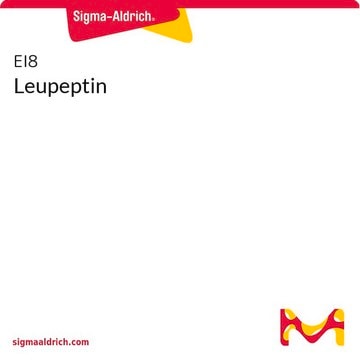205531
CA-074 Me
≥98% (HPLC), solid, Cathepsin B inhibitor, Calbiochem®
Synonyme(s) :
CA-074 Me, Cathepsin B Inhibitor IV, [L-3- trans-(Propylcarbamoyl)oxirane-2-carbonyl]-L-isoleucyl-L-proline Methyl Ester
About This Item
Produits recommandés
product name
CA-074 Me, CA-074 Me, CAS 147859-80-1, is a cell-permeable analog of CA-074 that acts as an irreversible inhibitor of intracellular cathepsin B.
Niveau de qualité
Pureté
≥98% (HPLC)
Forme
solid
Fabricant/nom de marque
Calbiochem®
Conditions de stockage
OK to freeze
Couleur
white
Solubilité
DMSO: 10 mg/mL
Conditions d'expédition
ambient
Température de stockage
−20°C
Description générale
Actions biochimiques/physiologiques
cathepsin B
Avertissement
Reconstitution
Autres remarques
Authier, F., et al. 1999. J. Biol. Chem.274, 33723.
Hill, P.A., et al. 1994. J. Cell Biochem. 56, 118.
Buttle, D.J., et al. 1992. Arch. Biochem. Biophys. 299, 377.
Informations légales
Code de la classe de stockage
11 - Combustible Solids
Classe de danger pour l'eau (WGK)
WGK 3
Point d'éclair (°F)
Not applicable
Point d'éclair (°C)
Not applicable
Certificats d'analyse (COA)
Recherchez un Certificats d'analyse (COA) en saisissant le numéro de lot du produit. Les numéros de lot figurent sur l'étiquette du produit après les mots "Lot" ou "Batch".
Déjà en possession de ce produit ?
Retrouvez la documentation relative aux produits que vous avez récemment achetés dans la Bibliothèque de documents.
Notre équipe de scientifiques dispose d'une expérience dans tous les secteurs de la recherche, notamment en sciences de la vie, science des matériaux, synthèse chimique, chromatographie, analyse et dans de nombreux autres domaines..
Contacter notre Service technique








